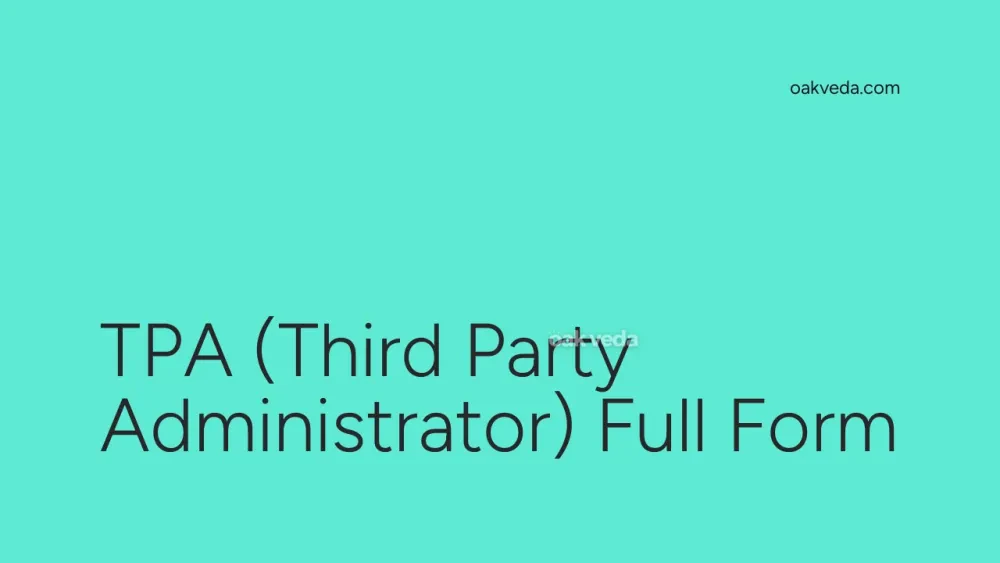
What is the Full Form of TPA?
The full form of TPA is Third Party Administrator. In the context of health insurance, a TPA acts as an intermediary between insurance providers and policyholders, playing a crucial role in managing claims and facilitating cashless services.
What is Third Party Administrator?
A Third Party Administrator (TPA) is an organization licensed by the Insurance Regulatory and Development Authority of India (IRDAI) to process health insurance claims and provide related services. TPAs serve as a bridge between insurance companies and insured individuals, streamlining the claims process and ensuring efficient service delivery.
Origin and Development of Third Party Administrators
The concept of TPAs in India emerged in the early 2000s as a response to the growing complexity of health insurance claims processing. The IRDAI introduced regulations for TPAs in 2001, recognizing their potential to improve the overall health insurance ecosystem. Since then, TPAs have become an integral part of the Indian health insurance industry, continuously evolving to meet the changing needs of insurers and policyholders.
How does Third Party Administrator work?
TPAs operate by following a structured process:
- Policy Issuance: When an insurance policy is sold, the insurer shares policyholder details with the TPA.
- ID Card Generation: The TPA issues a unique ID card to the policyholder, which is used for identification during claims.
- Network Hospital Management: TPAs maintain a network of hospitals that provide cashless services to policyholders.
- Claims Processing: When a claim is filed, the TPA verifies the details, assesses the claim, and recommends approval or rejection to the insurer.
- Settlement: For approved claims, the TPA facilitates the settlement process between the insurer and the healthcare provider.
Functions of Third Party Administrator
TPAs perform several key functions in the health insurance ecosystem:
- Claims Processing: Efficiently handling and processing insurance claims
- Cashless Hospitalization: Facilitating cashless treatment at network hospitals
- Policy Administration: Assisting in policy issuance and renewal processes
- Customer Support: Providing 24/7 assistance to policyholders
- Hospital Network Management: Maintaining and expanding the network of empaneled hospitals
- Fraud Detection: Implementing measures to identify and prevent fraudulent claims
Applications of Third Party Administrator
TPAs find applications in various aspects of health insurance:
- Individual Health Insurance: Managing claims for personal health policies
- Group Health Insurance: Administering corporate health insurance plans
- Government Health Schemes: Assisting in the implementation of state-sponsored health programs
- Travel Insurance: Handling medical claims for international travelers
- Senior Citizen Health Plans: Providing specialized services for elderly policyholders
Features of Third Party Administrator
Key features of TPAs include:
- IRDAI Licensing: All TPAs must be licensed and regulated by the IRDAI
- Technology-driven Operations: Utilizing advanced software for efficient claims processing
- Extensive Hospital Network: Maintaining tie-ups with a wide range of healthcare providers
- Specialized Expertise: Employing medical professionals for accurate claim assessment
- Transparent Communication: Keeping all stakeholders informed throughout the claims process
Benefits of Third Party Administrator
TPAs offer numerous advantages to both insurers and policyholders:
- Enhanced Efficiency: Streamlining claims processing and reducing turnaround times
- Cost Optimization: Helping insurers manage operational costs effectively
- Improved Customer Experience: Providing hassle-free cashless services to policyholders
- Fraud Prevention: Implementing robust systems to detect and prevent fraudulent claims
- Data Analytics: Offering valuable insights to insurers for product development and risk assessment
- Specialized Knowledge: Bringing expertise in healthcare and insurance regulations
Limitations or Challenges of Third Party Administrator
Despite their benefits, TPAs face certain challenges:
- Dependency on Insurers: TPAs' decision-making authority is limited by insurer guidelines
- Technology Adoption: Keeping pace with rapidly evolving technology can be challenging
- Regulatory Compliance: Adhering to changing IRDAI regulations and guidelines
- Customer Expectations: Meeting increasing demands for faster and more efficient services
- Data Security: Ensuring the protection of sensitive policyholder information
Future Developments in Third Party Administrator Technology
The TPA industry is poised for significant technological advancements:
- Artificial Intelligence: Implementing AI for faster claims processing and fraud detection
- Blockchain: Exploring blockchain technology for secure and transparent data management
- Mobile Applications: Developing user-friendly apps for policyholders to manage claims
- Telemedicine Integration: Incorporating telemedicine services into the TPA ecosystem
- Predictive Analytics: Utilizing data analytics for proactive health management
FAQs on TPA Full Form
-
What is the primary role of a TPA in health insurance? A TPA's main role is to process health insurance claims and facilitate cashless services for policyholders.
-
How does a TPA benefit policyholders? TPAs provide faster claim settlements, cashless hospitalization, and 24/7 customer support to policyholders.
-
Are TPAs regulated in India? Yes, TPAs are regulated by the Insurance Regulatory and Development Authority of India (IRDAI).
-
Can a policyholder choose their own TPA? Generally, the insurance company selects the TPA. Policyholders cannot choose their own TPA.
-
Do all health insurance policies use TPAs? While most health insurance policies in India use TPAs, some insurers manage claims in-house without TPAs.
In conclusion, Third Party Administrators play a vital role in the health insurance industry, bridging the gap between insurers and policyholders. By streamlining claims processing, facilitating cashless services, and providing specialized expertise, TPAs contribute significantly to improving the overall health insurance experience for all stakeholders involved.
You may be interested in:

